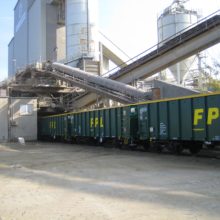
“RFG acknowledges that ORR has, in response to the concerns raised by industry, pulled back from some of the more damaging proposals in its consultation, including geographic charging, and even higher possible tariffs. The decision to phase in the freight specific charge is particularly welcome,” says RFG. “However, the impacts of these conclusions are still likely to be significant – with Scottish coal producers likely to see their transport costs rise by around 15 percent, and the steel sector facing a 9 percent rise in iron ore transport costs. And for other sectors, such as intermodal and aggregates, the prospect of charges rising even close to the capped level in 2014 is deeply concerning.
Maggie Simpson, RFG executive director, said: “The rail freight sector is committed to increasing its efficiency and contributing to a lower cost railway. But significant increases in access charges – such as the potential 23 percent rise for all traffic – risks destabilising the sector and forcing business back to road. ORR has made some welcome decisions, but the overall package of conclusions does not give the comfort and confidence necessary for rail freight to fulfil its potential in the next five year period. We will be pressing ORR and Network Rail to ensure that a more satisfactory position can be reached by the summer.”

